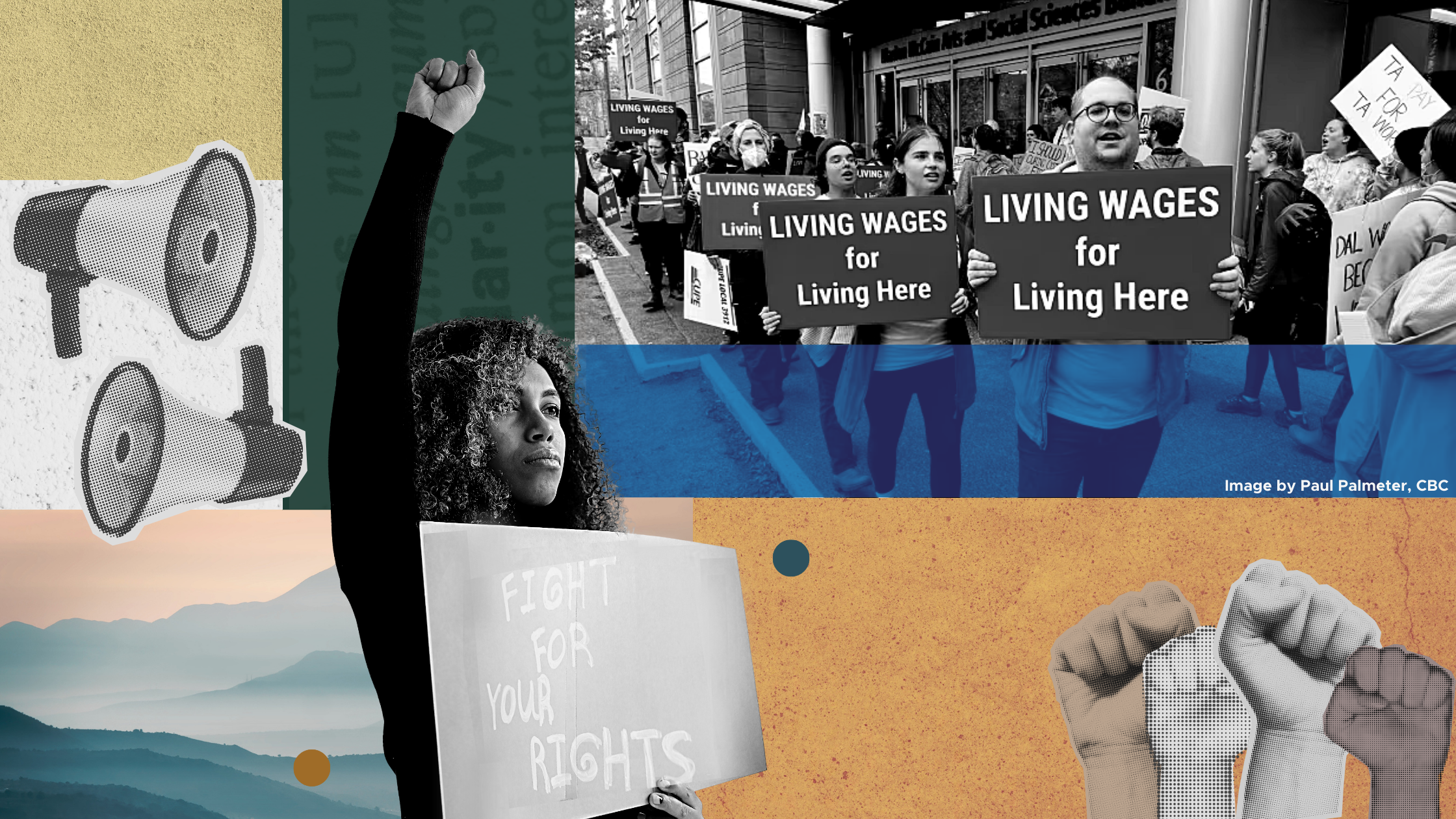
Lydia Phillip
Communications Manager

Annika Voltan
Executive Director
Over the past few years, the landscape of our province has shifted drastically, becoming an increasingly difficult place to survive, let alone live in. Employment uncertainty, increasing costs, racism and discrimination, and inadequate housing and healthcare access continue to be top concerns for sectors that are chronically undervalued and often led by women – as is the case for the Community Impact (Nonprofit) Sector. With living costs comparable to British Colombia and Ontario and some of the lowest wages in the country, the socioeconomic crisis continues to unfold across our communities.
And as we write this piece, student support workers across Nova Scotia are on the picket lines fighting for a living wage. Many of them support students from African Nova Scotian and Indigenous communities, as well as disabled and neurodiverse students. Like so many in our sector, their work is undervalued despite the critical role they play in addressing systemic inequities. As the cost of living soars, who can justify working below a living wage?
Throughout history, we’ve seen the benefits of social and labour movements in the progression of affirmative action, increased wages, better benefits, and safer working conditions. But we are still caught in a fight for fairness, and the need seems to only grow stronger. It’s time to ask: as a sector, where do we see ourselves in collective advocacy and action?
People: Supporting the Critical Work
At its core, the Community Impact Sector centres people and the planet, working to mitigate the harms caused by capitalism and colonialism. People working in the sector with the know-how and skills to support victims of gender-based violence, racism, ableism, ageism, etc. through a trauma-informed lens are often not receiving a living wage – forcing them to seek employment elsewhere. Without these organizations and groups, quality of life would be jeopardized and members of our society would fall through the cracks of public systems.
This is not a new story. We know that impact organizations and volunteers provide essential services not available in publicly funded institutions. They play an essential role in ensuring people have access to shelter, housing, food, mental health supports, transportation, and social connections. And yet with a volunteer base that is in a state of decline, they are forced to rely on short-term grants and minimal operating funding that doesn’t factor in incremental cost-of-living increases.
Over the past few months, our team was in community deepening our understanding of the current challenges and opportunities facing organizations and groups serving the people made vulnerable by our society. For example, we heard from volunteers who are running programs out of rural community halls to help older adults fight depression and loneliness, offer welcoming spaces for newcomers, and strengthen social connections – all while struggling to pay their utilities.
We spoke to people providing transportation in rural areas where public transit isn’t an option. We heard about how drivers play multiple roles like making sure people get to vital medical appointments, supporting those with mental health challenges, and providing companionship to people suffering from social isolation – all while making minimum wage.
And yet, the Community Impact Sector remains off the radar and in the shadows, undervalued and under-funded. The status quo isn’t serving ourselves or our communities, and over time we’ve witnessed tipping points for social service providers and the resulting action.
Picket Lines: Fighting Against Chronic Undervaluation
There is a long history of working-class mobilization and labour movements in what we now call Canada and Nova Scotia. Historically Nova Scotians have played key roles in influencing provincial policy, worker’s rights, and labour standards – including the Amherst General Strike in 1919 and the Sydney Steel Strike in 1923.
More recently, the COVID-19 pandemic highlighted the fact that our healthcare system is near the verge of collapse. In Nova Scotia, the recruitment and retention of health care providers has been a top priority. Last year, continuing care assistants (CCAs) received a 23% pay increase, making them the highest paid in the region. In March, nurses were given a $10,000 bonus and a promise of another $10,000 next year if they commit to staying in the system for two more years.
Beyond the healthcare system, people are pushing back. Nationally, 120,000 federal government employees traded their desks and computers for picket lines to demand wage increases and remote work options. And, as noted, on May 10th, Nova Scotia’s school support workers went on strike to advocate for a living wage.
The social services provided by the sector are not on the periphery of public services – they are integral to ensuring people can access healthcare, have supports outside of public institutions, and have basic needs met. But the Community Impact Sector is notoriously fragmented – too caught up in power dynamics, funder reliance, and urgency culture to demand change – effectively keeping us firmly rooted in the status quo. As a sector, we need to be honest with ourselves in how we’re perpetuating the charity mindset and reinforcing harmful structures rather than coming together to advance change.
Power: Challenging Current Systems
The sector is deeply entangled in colonialism and capitalism. The structures that uphold a white, settler patriarchy prevent us from effectively working together to advocate for our needs and increase our impact. These dominant systems have also strategically built the frameworks that impact organizations operate within. Current models spur competition, discourage collaboration, and serve systems of power.
Those with economic and social power continue to set sector priorities and push “innovation” over resourcing what’s working. Too often this means leaning into funder priorities instead of community needs, disproportionately serving larger, white-led organizations, as well as a lack of operational and administrative supports and the overwhelm associated with crisis management. Scarcity mindsets and individualistic tendencies lead to silos within the sector that continue to reinforce existing narratives and behaviours.
We hold the potential to be a source for the boldness, innovation and community collaboration that’s needed to drive equitable solutions, but transformative work is near impossible within the constraints of scarcity, competition, and control mechanisms. Though we have an idealist view of our work, we need to make space for acknowledging the ways we maintain power dynamics and white supremacy. How can we unite our voices and initiate collective action to advance equity and justice together?
Finding Our Collective Voice
Over and over, we hear from those we engage with how much people are craving opportunities and spaces to connect and collaborate. There’s an appetite for innovative models and more inventive practices. We believe that the sector has the potential to be a catalyst for brave action when we can dream beyond the status quo. In the wake of the Nova Scotia Community Impact Sector Day of Recognition, it’s time to come together to challenge the systems and structures that have stood in the way of justice and transformative work in the sector.
So, as we celebrate our work and resiliency, one of the most caring things we can do is critique the way we show up in relation to capitalism and colonialism. What will we say no to? Whose voices will we consciously and intentionally amplify? How can we use our spheres of influence toward a better future? How will this deepen our impact?
As an organization, we’re listening to the issues raised by community voices and working on how we can be more strategic and attentive in our solutions, communications, partnerships, and supports. IONS will soon be launching a new strategy and action plan with heightened emphasis on advocacy and systems change across the sector.
There is power in community, and there is hope in the future when together we reimagine our place – outgrowing traditional structures and independent of these systems. Our imagination cannot be limited by frameworks and boxes. We need to step outside of what we know to collate, mobilize, and move collectively. We hope you’ll join us on this journey.
Written by:

Lydia Phillip (she/her)
Communications Manager
Lydia stewards IONS’ external communications, branding, social media, and website development. She creates content and contributes to IONS’ work through championing the sector through her power in writing and storytelling.

Annika Voltan (she/her)
Executive Director
Annika supports the Board of Directors, steers the operations and the implementation of the strategic plan, and helps steward the NS Nonprofit Coalition. She develops partnerships and project opportunities and helps elevate the voice of the sector.
Liked this post? Please share!

0 Comments